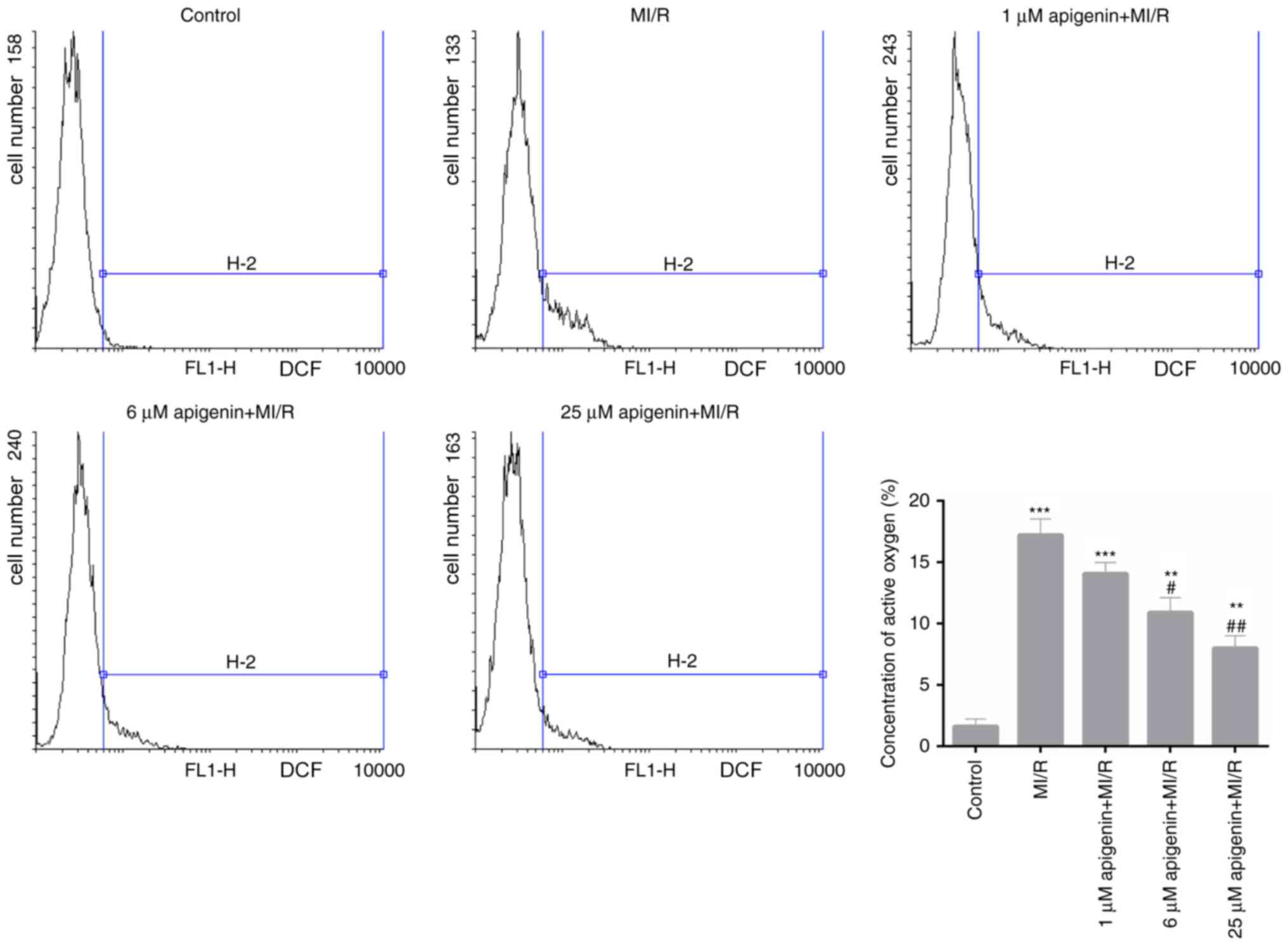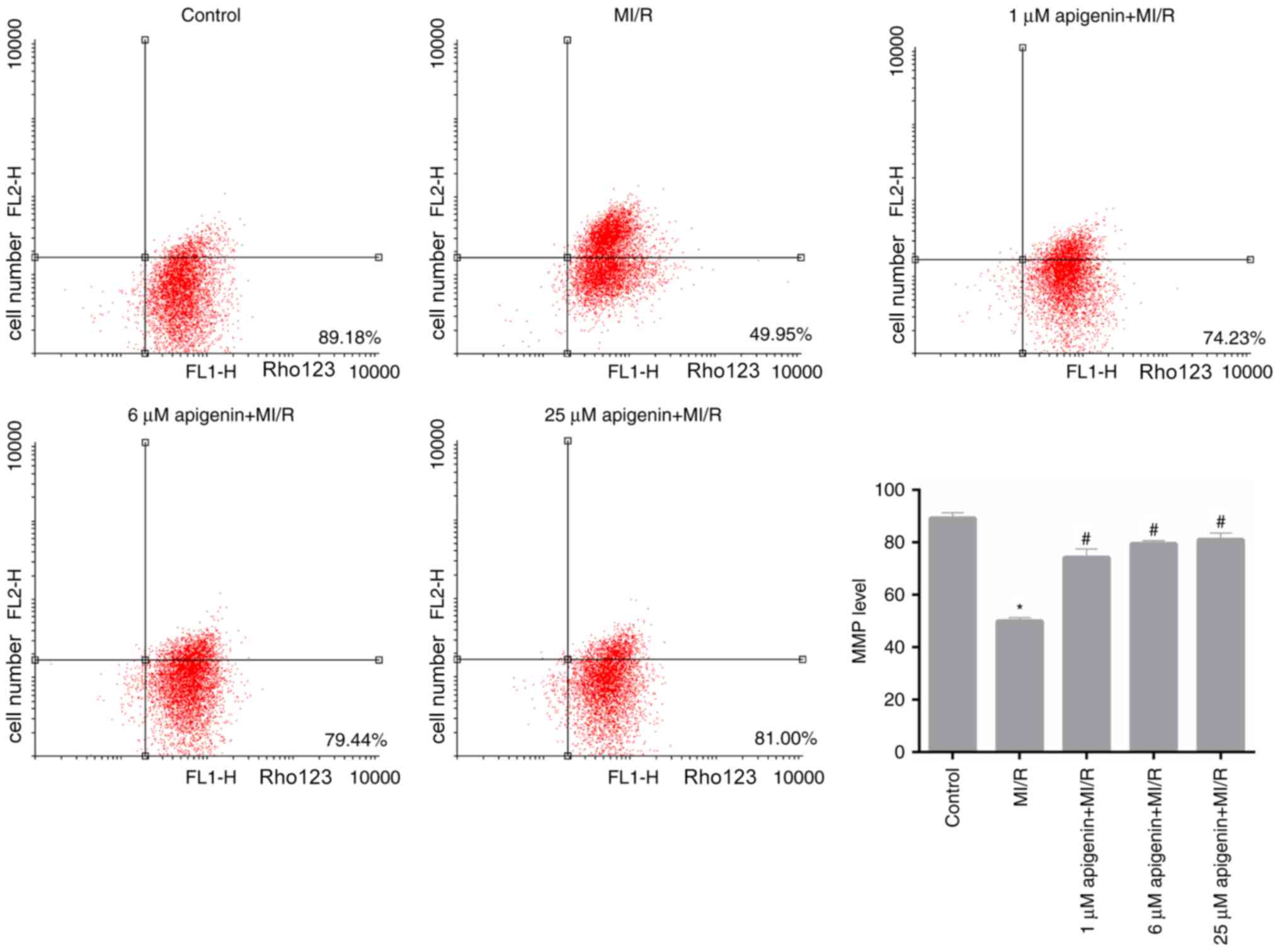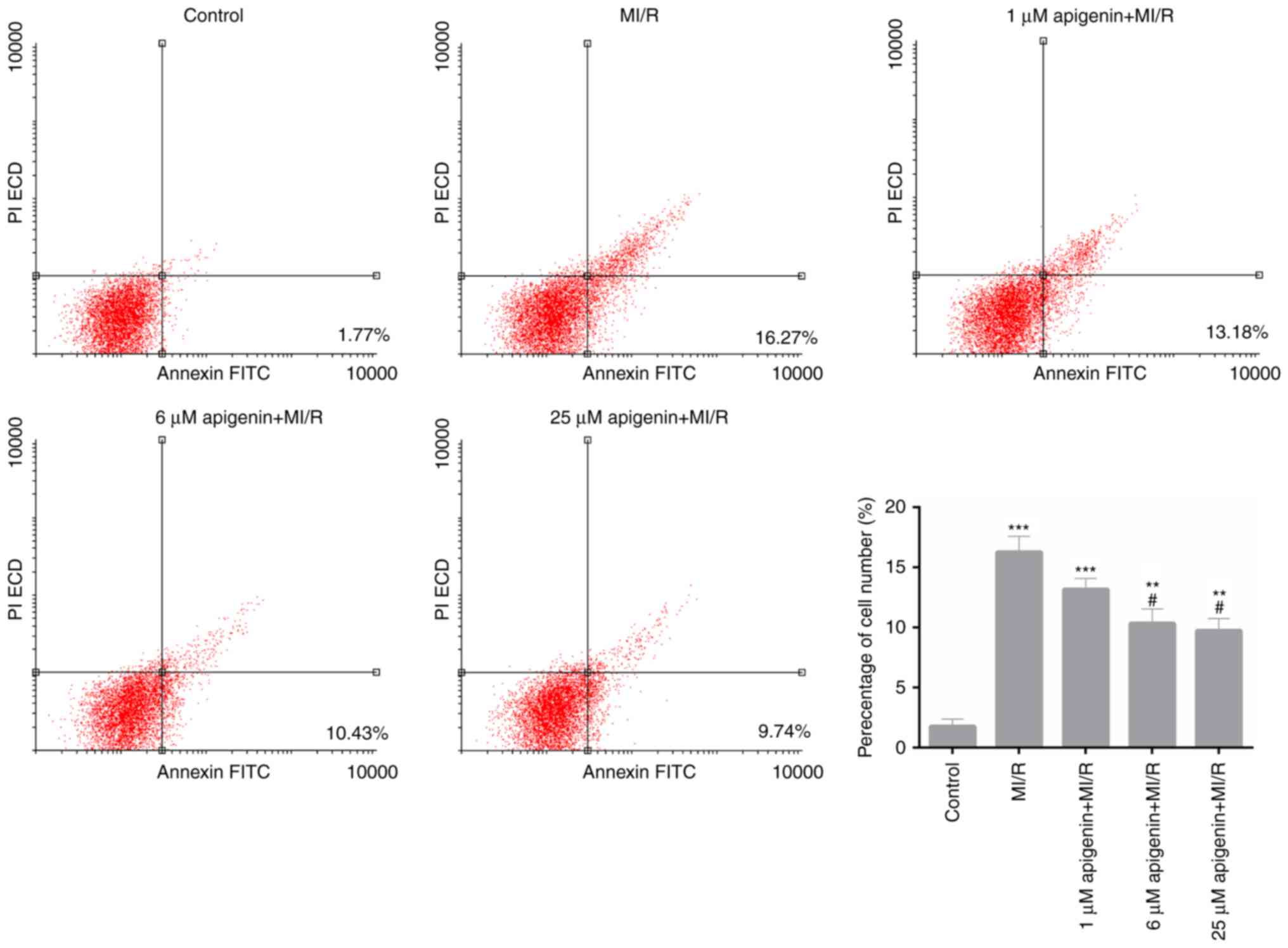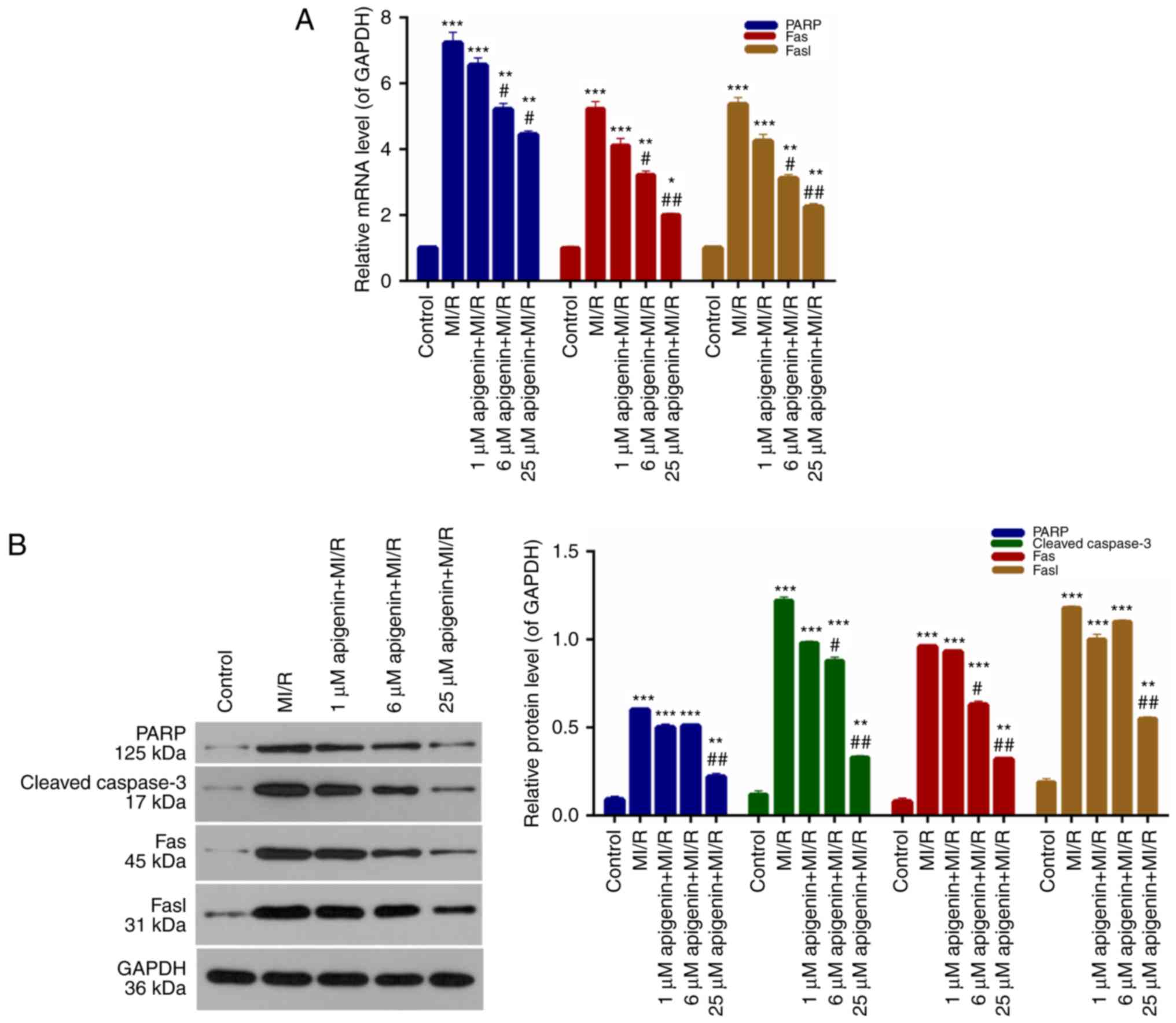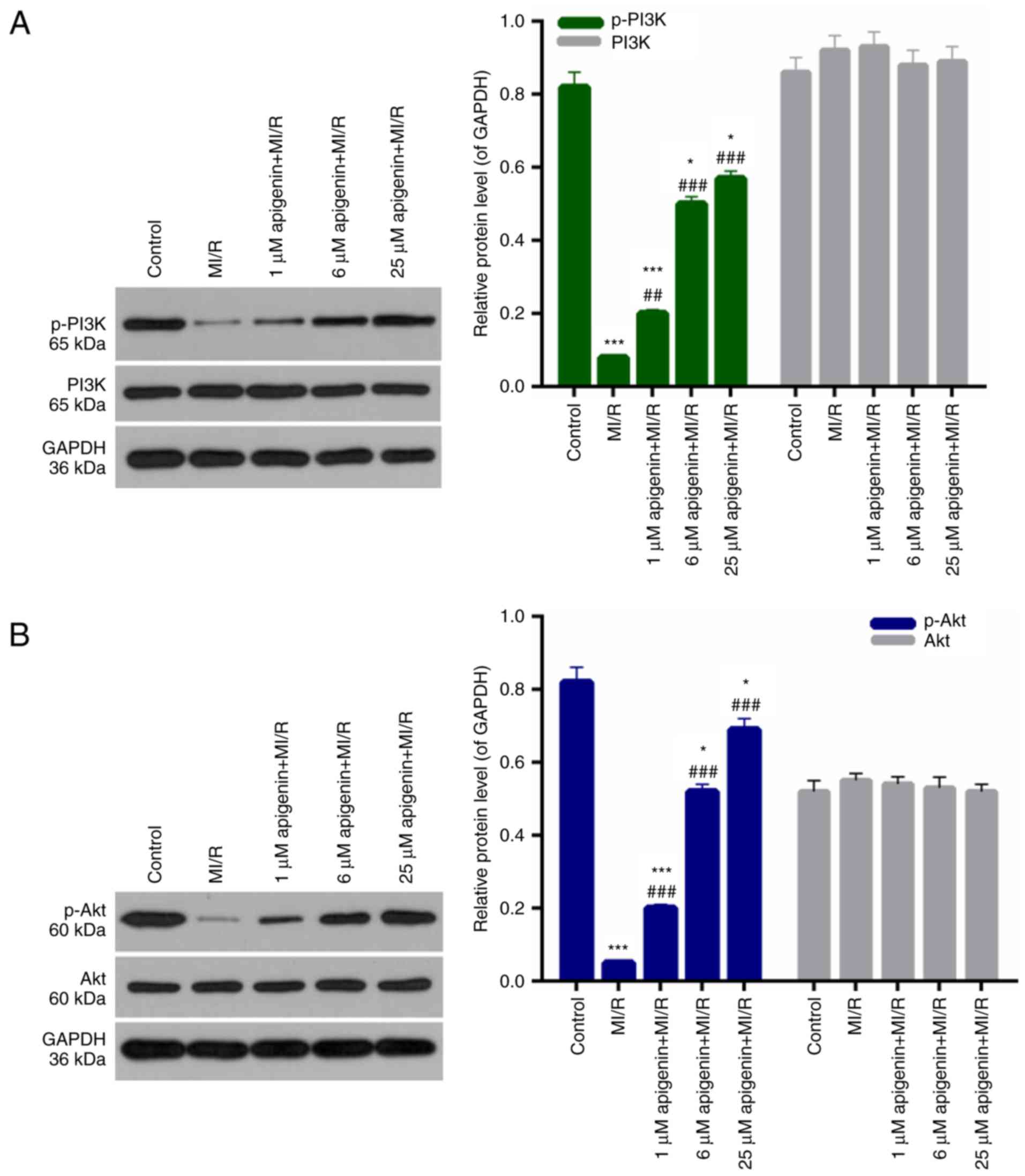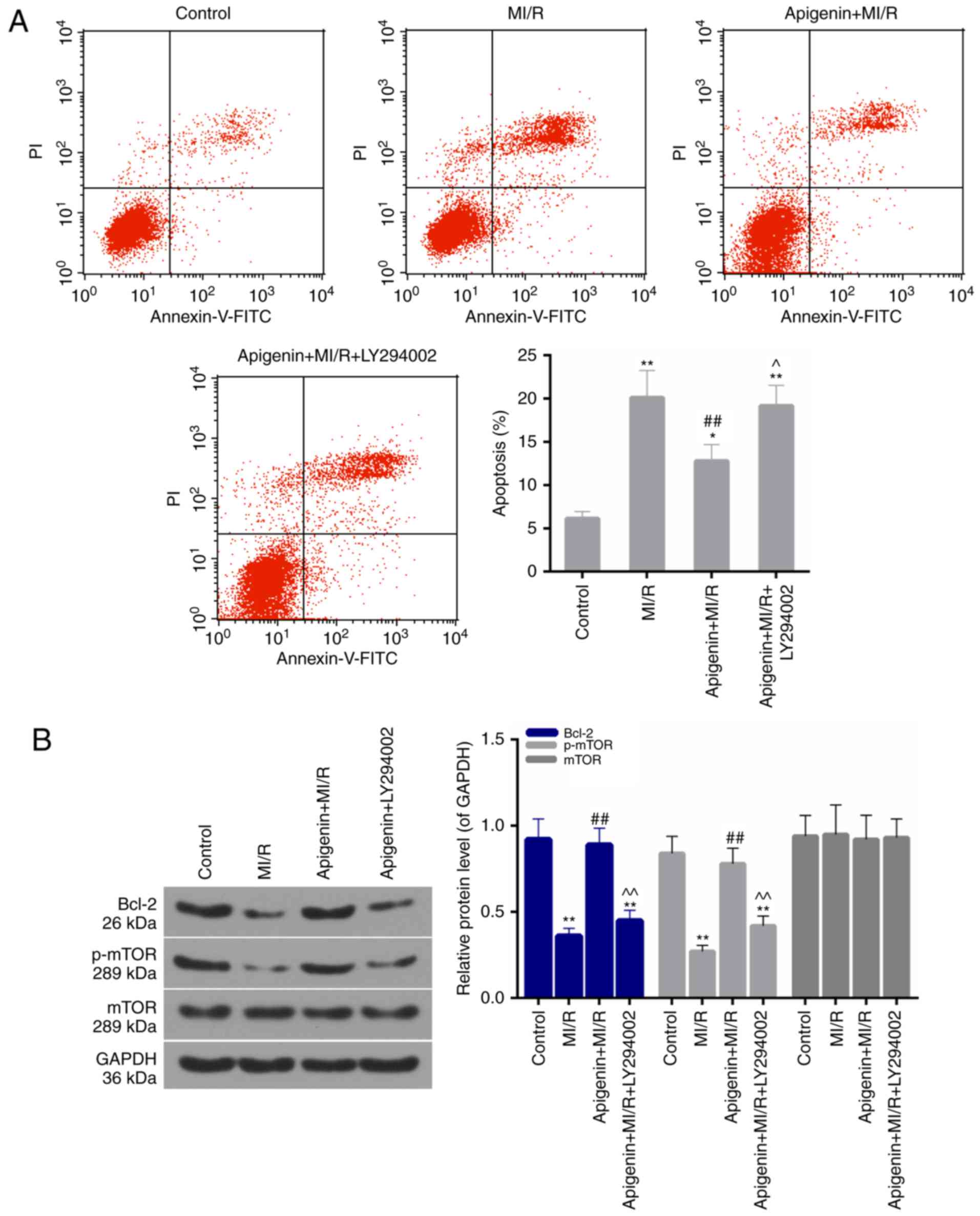|
1
|
McCullough PA: Coronary artery disease.
Clin J Am Soc Nephrol. 2:611–616. 2007. View Article : Google Scholar : PubMed/NCBI
|
|
2
|
GBD 2015 DALYs and HALE Collaborators:
Global, regional, and national disability-adjusted life-years
(DALYs) for 315 diseases and injuries and healthy life expectancy
(HALE), 1990–2015: A systematic analysis for the Global Burden of
Disease Study 2015. Lancet. 388:1603–1658. 2016. View Article : Google Scholar : PubMed/NCBI
|
|
3
|
Arslan F, Lai RC, Smeets MB, Akeroyd L,
Choo A, Aguor EN, Timmers L, van Rijen HV, Doevendans PA,
Pasterkamp G, et al: Mesenchymal stem cell-derived exosomes
increase ATP levels, decrease oxidative stress and activate
PI3K/Akt pathway to enhance myocardial viability and prevent
adverse remodeling after myocardial ischemia/reperfusion injury.
Stem Cell Res. 10:301–312. 2013. View Article : Google Scholar : PubMed/NCBI
|
|
4
|
Iwasaki K: Myocardial ischemia is a key
factor in the management of stable coronary artery disease. World J
Cardiol. 6:130–139. 2014. View Article : Google Scholar : PubMed/NCBI
|
|
5
|
Hausenloy DJ and Yellon DM: Myocardial
ischemia-reperfusion injury: A neglected therapeutic target. J Clin
Invest. 123:92–100. 2013. View
Article : Google Scholar : PubMed/NCBI
|
|
6
|
Shin IW, Jang IS, Lee SM, Park KE, Ok SH,
Sohn JT, Lee HK and Chung YK: Myocardial protective effect by
ulinastatin via an anti-inflammatory response after regional
ischemia/reperfusion injury in an in vivo rat heart model. Korean J
Anesthesiol. 61:499–505. 2011. View Article : Google Scholar : PubMed/NCBI
|
|
7
|
Larue L and Bellacosa A:
Epithelial-mesenchymal transition in development and cancer: Role
of phosphatidylinositol 3′-kinase/AKT pathways. Oncogene.
24:7443–7454. 2005. View Article : Google Scholar : PubMed/NCBI
|
|
8
|
Fliss H and Gattinger D: Apoptosis in
ischemic and reperfused rat myocardium. Circ Res. 79:949–956. 1996.
View Article : Google Scholar : PubMed/NCBI
|
|
9
|
Saraste A, Pulkki K, Kallajoki M,
Henriksen K, Parvinen M and Voipio-Pulkki LM: Apoptosis in human
acute myocardial infarction. Circulation. 95:320–323. 1997.
View Article : Google Scholar : PubMed/NCBI
|
|
10
|
Dhanasekaran A, Gruenloh SK, Buonaccorsi
JN, Zhang R, Gross GJ, Falck JR, Patel PK, Jacobs ER and Medhora M:
Multiple antiapoptotic targets of the PI3K/Akt survival pathway are
activated by epoxyeicosatrienoic acids to protect cardiomyocytes
from hypoxia/anoxia. Am J Physiol Heart Circ Physiol.
294:H724–H735. 2008. View Article : Google Scholar : PubMed/NCBI
|
|
11
|
Wu W, Lee WL, Wu YY, Chen D, Liu TJ, Jang
A, Sharma PM and Wang PH: Expression of constitutively active
phosphatidylinositol 3-kinase inhibits activation of caspase 3 and
apoptosis of cardiac muscle cells. J Biol Chem. 275:40113–40119.
2000. View Article : Google Scholar : PubMed/NCBI
|
|
12
|
Vander Heiden MG, Plas DR, Rathmell JC,
Fox CJ, Harris MH and Thompson CB: Growth factors can influence
cell growth and survival through effects on glucose metabolism. Mol
Cell Biol. 21:5899–5912. 2001. View Article : Google Scholar : PubMed/NCBI
|
|
13
|
Henshall DC, Araki T, Schindler CK, Lan
JQ, Tiekoter KL, Taki W and Simon RP: Activation of
Bcl-2-associated death protein and counter-response of Akt within
cell populations during seizure-induced neuronal death. J Neurosci.
22:8458–8465. 2002. View Article : Google Scholar : PubMed/NCBI
|
|
14
|
Bartling B, Tostlebe H, Darmer D, Holtz J,
Silber RE and Morawietz H: Shear stress-dependent expression of
apoptosis-regulating genes in endothelial cells. Biochem Biophys
Res Commun. 278:740–746. 2000. View Article : Google Scholar : PubMed/NCBI
|
|
15
|
Rodriguez-Mateos A, Vauzour D, Krueger CG,
Shanmuganayagam D, Reed J, Calani L, Mena P, Del Rio D and Crozier
A: Bioavailability, bioactivity and impact on health of dietary
flavonoids and related compounds: An update. Arch Toxicol.
88:1803–1853. 2014. View Article : Google Scholar : PubMed/NCBI
|
|
16
|
Singh JP, Selvendiran K, Banu SM,
Padmavathi R and Sakthisekaran D: Protective role of Apigenin on
the status of lipid peroxidation and antioxidant defense against
hepatocarcinogenesis in Wistar albino rats. Phytomedicine.
11:309–314. 2004. View Article : Google Scholar : PubMed/NCBI
|
|
17
|
Birt DF, Walker B, Tibbels MG and Bresnick
E: Anti-mutagenesis and anti-promotion by apigenin, robinetin and
indole-3-carbinol. Carcinogenesis. 7:959–963. 1986. View Article : Google Scholar : PubMed/NCBI
|
|
18
|
Funakoshi-Tago M, Nakamura K, Tago K,
Mashino T and Kasahara T: Anti-inflammatory activity of
structurally related flavonoids, apigenin, luteolin and fisetin.
Int Immunopharmacol. 11:1150–1159. 2011. View Article : Google Scholar : PubMed/NCBI
|
|
19
|
Shukla S and Gupta S: Apigenin: A
promising molecule for cancer prevention. Pharm Res. 27:962–778.
2010. View Article : Google Scholar : PubMed/NCBI
|
|
20
|
Yin Y, Guan Y, Duan J, Guo W, Zhu Y, Wei
Q, Guo C, Zhou D, Wang Y, Xi M and Wen A: Cardioprotective effect
of Danshensu against myocardial ischemia/reperfusion injury and
inhibits apoptosis of H9c2 cardiomyocytes via Akt and ERK1/2
phosphorylation. Eur J Pharmacol. 699:219–226. 2013. View Article : Google Scholar : PubMed/NCBI
|
|
21
|
Doukas J, Wrasidlo W, Noronha G,
Dneprovskaia E, Fine R, Weis S, Hood J, Demaria A, Soll R and
Cheresh D: Phosphoinositide 3-kinase/inhibition limits infarct size
after myocardial ischemia/reperfusion injury. Proc Natl Acad Sci
USA. 103:19866–19871. 2006. View Article : Google Scholar : PubMed/NCBI
|
|
22
|
Zhai M, He L, Ju X, Shao L, Li G, Zhang Y,
Liu Y and Zhao H: Icariin acts as a potential agent for preventing
cardiac ischemia/reperfusion injury. Cell Biochem Biophys.
72:589–597. 2015. View Article : Google Scholar : PubMed/NCBI
|
|
23
|
Nishimura S, Akagi M, Yoshida K, Hayakawa
S, Sawamura T, Munakata H and Hamanishi C: Oxidized low-density
lipoprotein (ox-LDL) binding to lectin-like ox-LDL receptor-1
(LOX-1) in cultured bovine articular chondrocytes increases
production of intracellular reactive oxygen species (ROS) resulting
in the activation of NF-kappaB. Osteoarthritis Cartilage.
12:568–576. 2004. View Article : Google Scholar : PubMed/NCBI
|
|
24
|
Kadirve G, Kumar S, Ghosh SK and Perumal
P: Activity of antioxidative enzymes in fresh and frozen thawed
buffalo (Bubalus bubalis) spermatozoa in relation to lipid
peroxidation and semen quality. Asian Pac J Repro. 3:210–217. 2014.
View Article : Google Scholar
|
|
25
|
Qin J, Kang Y, Xu Z, Zang C, Fang B and
Liu X: Dioscin prevents the mitochondrial apoptosis and attenuates
oxidative stress in cardiac H9c2 cells. Drug Res (Stuttg).
64:47–52. 2014.PubMed/NCBI
|
|
26
|
Shen ZY, Shen WY, Chen MH, Shen J, Cai WJ
and Zeng Y: Mitochondria, calcium and nitric oxide in the apoptotic
pathway of esophageal carcinoma cells induced by As2O3. Int J Mol
Med. 9:385–390. 2002.PubMed/NCBI
|
|
27
|
Livak KJ and Schmittgen TD: Analysis of
relative gene expression data using real-time quantitative PCR and
the 2(-Delta Delta C(T)) method. Methods. 25:402–408. 2001.
View Article : Google Scholar : PubMed/NCBI
|
|
28
|
Vanamali A: Climate strategy is critical
for india's future. Am Heart J. 163:20–26. 2011.PubMed/NCBI
|
|
29
|
Wei J, Velazquez EJ, Samad Z, Kuchibhatla
M, Martsberger C, Rogers J, Williams R, Kuhn C, Ortel TL, Becker
RC, et al: Responses of mental stress induced myocardial ischemia
to escitalopram treatment: Background, design, and method for the
REMIT Trial. Am Heart J. 163:202012. View Article : Google Scholar : PubMed/NCBI
|
|
30
|
Sirvinskas E, Kinderyte A, Trumbeckaite S,
Lenkutis T, Raliene L, Giedraitis S, Macas A and Borutaite V:
Effects of sevoflurane vs. propofol on mitochondrial functional
activity after ischemia-reperfusion injury and the influence on
clinical parameters in patients undergoing CABG surgery with
cardiopulmonary bypass. Perfusion. 30:590–595. 2015. View Article : Google Scholar : PubMed/NCBI
|
|
31
|
Yuan SM and Jing H: Insights into the
monomers and single drugs of Chinese herbal medicine on myocardial
preservation. Afr J Tradit Complement Altern Med. 8:104–127.
2011.PubMed/NCBI
|
|
32
|
Lu F, Fernandes SM and Davis AE III: The
effect of C1 inhibitor on myocardial ischemia and reperfusion
injury. Cardiovasc Pathol. 22:75–80. 2013. View Article : Google Scholar : PubMed/NCBI
|
|
33
|
Chen C, He H, Luo Y, Zhou M, Yin D and He
M: Involvement of Bcl-2 signal pathway in the protective effects of
apigenin on anoxia/reoxygenation-induced myocardium injury. J
Cardiovasc Pharmacol. 67:152–163. 2016. View Article : Google Scholar : PubMed/NCBI
|
|
34
|
Anusha C, Sumathi T and Joseph LD:
Protective role of apigenin on rotenone induced rat model of
Parkinson's disease: Suppression of neuroinflammation and oxidative
stress mediated apoptosis. Chem Biol Interact. 269:67–79. 2017.
View Article : Google Scholar : PubMed/NCBI
|
|
35
|
Han Y, Zhang T, Su J, Zhao Y, Chenchen
Wang and Li X: Apigenin attenuates oxidative stress and neuronal
apoptosis in early brain injury following subarachnoid hemorrhage.
J Clin Neurosci. 40:157–162. 2017. View Article : Google Scholar : PubMed/NCBI
|
|
36
|
Naveen P, Kumar NS, Sanjeev G, Gowda KMD
and Madhu LN: Radioprotective effect of Nardostachys
jatamansi against whole body electron beam induced oxidative
stress and tissue injury in rats. J Phar Res. 4:2197–2200.
2011.
|
|
37
|
Thastrup O, Cullen PJ, Drobak BK, Hanley
MR and Dawson AP: Thapsigargin, a tumor promoter, discharges
intracellular Ca2+ stores by specific inhibition of the
endoplasmic reticulum Ca2(+)-ATPase. Proc Natl Acad Sci USA.
87:2466–2470. 1990. View Article : Google Scholar : PubMed/NCBI
|
|
38
|
Scherer NM and Deamer DW: Oxidative stress
impairs the function of sarcoplasmic reticulum by oxidation of
sulfhydryl groups in the Ca2+-ATPase. Arch Biochem
Biophys. 246:589–601. 1986. View Article : Google Scholar : PubMed/NCBI
|
|
39
|
Wang XQ, Xiao AY, Sheline C, Hyrc K, Yang
A, Goldberg MP, Choi DW and Yu SP: Apoptotic insults impair
Na+, K+-ATPase activity as a mechanism of
neuronal death mediated by concurrent ATP deficiency and oxidant
stress. J Cell Sci. 116:2099–2110. 2003. View Article : Google Scholar : PubMed/NCBI
|
|
40
|
Apel K and Hirt H: Reactive oxygen
species: Metabolism, oxidative stress, and signal transduction.
Annu Rev Plant Biol. 55:373–399. 2004. View Article : Google Scholar : PubMed/NCBI
|
|
41
|
Guerin P, El Mouatassim S and Menezo Y:
Oxidative stress and protection against reactive oxygen species in
the pre-implantation embryo and its surroundings. Hum Reprod
Update. 7:175–189. 2001. View Article : Google Scholar : PubMed/NCBI
|
|
42
|
Irwin WA, Bergamin N, Sabatelli P,
Reggiani C, Megighian A, Merlini L, Braghetta P, Columbaro M,
Volpin D, Bressan GM, et al: Mitochondrial dysfunction and
apoptosis in myopathic mice with collagen VI deficiency. Nat Genet.
35:367–371. 2003. View
Article : Google Scholar : PubMed/NCBI
|
|
43
|
Borutaite V, Jekabsone A, Morkuniene R and
Brown GC: Inhibition of mitochondrial permeability transition
prevents mitochondrial dysfunction, cytochrome c release and
apoptosis induced by heart ischemia. J Mol Cell Cardiol.
35:357–366. 2003. View Article : Google Scholar : PubMed/NCBI
|
|
44
|
Ly JD, Grubb DR and Lawen A: The
mitochondrial membrane potential (deltapsi(m)) in apoptosis; an
update. Apoptosis. 8:115–128. 2003. View Article : Google Scholar : PubMed/NCBI
|
|
45
|
Ott M, Gogvadze V, Orrenius S and
Zhivotovsky B: Mitochondria, oxidative stress and cell death.
Apoptosis. 12:913–922. 2007. View Article : Google Scholar : PubMed/NCBI
|
|
46
|
Yu W, Sun H, Zha W, Cui W, Xu L, Min Q and
Wu J: Apigenin attenuates adriamycin-induced cardiomyocyte
apoptosis via the PI3K/AKT/mTOR pathway. Evid Based Complement
Alternat Med. 2017:25906762017. View Article : Google Scholar : PubMed/NCBI
|
|
47
|
Jia Y, Zuo D, Li Z, Liu H, Dai Z, Cai J,
Pang L and Wu Y: Astragaloside IV inhibits doxorubicin-induced
cardiomyocyte apoptosis mediated by mitochondrial apoptotic pathway
via activating the PI3K/Akt pathway. Chem Pharm Bull (Tokyo).
62:45–53. 2014. View Article : Google Scholar : PubMed/NCBI
|
|
48
|
Yang B, Yan P, Gong H, Zuo L, Shi Y, Guo
J, Guo R, Xie J and Li B: TWEAK protects cardiomyocyte against
apoptosis in a PI3K/AKT pathway dependent manner. Am J Transl Res.
8:3848–3860. 2016.PubMed/NCBI
|
|
49
|
Yu W, Zha W, Ke Z, Min Q, Li C, Sun H and
Liu C: Curcumin protects neonatal rat cardiomyocytes against high
glucose-induced apoptosis via PI3K/Akt signalling pathway. J
Diabetes Res. 2016:41585912016. View Article : Google Scholar : PubMed/NCBI
|
|
50
|
Saiki S, Sasazawa Y, Imamichi Y, Kawajiri
S, Fujimaki T, Tanida I, Kobayashi H, Sato F, Sato S and Ishikawa
K: Caffeine induces apoptosis by enhancement of autophagy via
PI3K/Akt/mTOR/p70S6K inhibition. Autophagy. 7:176–187. 2011.
View Article : Google Scholar : PubMed/NCBI
|

















